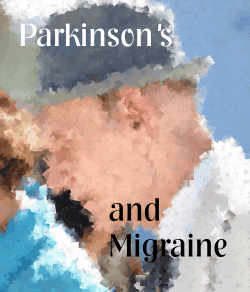Does Migraine increase risk of Parkinson’s?
A study published in the journal Neurology this month is prompting a lot of discussion about the link between migraine and Parkinson’s. Researchers are suggesting that patients with migraine may be more likely to develop Parkinson’s and other movement disorders later in life.
 |
The study followed 5764 middle aged patients for 25 years. The study focused both on Parkinson’s disease and restless legs syndrome.
It comes as no surprise that those with headache disorders were more likely to have restless legs syndrome. There has been a known connection for a long time.
But those with migraine in particular were more likely to be diagnosed with Parkinson’s disease (PD) or to develop PD-like symptoms.
Basically, that means that these patients weren’t specifically screened for this study to see if they had PD; researchers simply checked to see if they had been diagnosed with PD or had PD typical symptoms. This is important, because this study is not “proof” that migraine patients are more likely to develop PD, but it does show that they may be more likely to develop symptoms common to PD. Yes, it is likely that many of these patients really do have PD.
So when it came to symptoms themselves, 7.5% of those with no headaches developed symptoms, but 12.6% of those with migraine without aura did, and 19.7% of those with migraine with aura did. Those with migraine with aura were more than twice as likely to develop PD-type symptoms.
Those with migraine with aura were also more than twice as likely to be diagnosed with Parkinson’s disease.
However, we’re still only talking about two or three migraine patients out of a hundred who were diagnosed with PD, as opposed to one or two without migraine.
In other words, as is the case with stroke, migraine may increase your risk, but chances are extremely good that you’ll never have a problem.
Typical symptoms of PD include:
- Tremor: an involuntary movement, often beginning in the hands.
- Stiff muscles: which may make it difficult to move or may be painful.
- Posture/balance: Becoming stooped or having difficulty with balance.
As you might notice, these and related PD symptoms could be a sign of something else. In fact, stiffness and difficulty with balance are not uncommon in migraine itself.
So once again, is migraine actually increasing your risk of PD itself? Are there similar symptoms? Or a common cause of both?
This study seems significant enough to continue the research.
Why would PD and migraine be related? They are certainly neurological components to both.
Some have suggested that dopamine may play a role in both. However, while dopamine is low in patients with PD, it may rise in patients having a migraine attack. One study even suggested that patients with migraine who developed PD would actually have less severe symptoms than patients who had not had migraine.
For now, the research will probably be focused on the genetic roots of both Parkinson’s and migraine disease, as well as the neurological processes that bring on the symptoms of both.
For further reading:
- Migraine in Middle Age Linked to Increased Risk of Parkinson’s, Movement Disorders Later (American Academy of Neurology)
- Midlife migraine and late-life parkinsonism: AGES-Reykjavik Study. (study abstract)
- Midlife Migraine Linked to Later Parkinson’s (Medscape)
- What Causes Parkinson’s Disease? (WebMD)
- Parkinson’s disease (Mayo Clinic)
